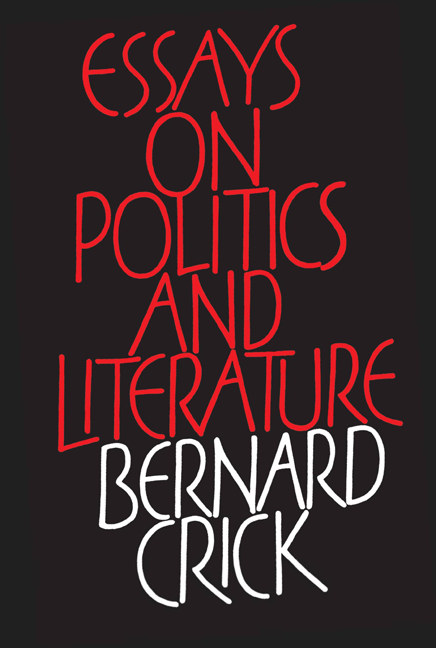Book contents
- Frontmatter
- Contents
- Preface
- Acknowledgements
- Foreword by David Daiches
- One Literature and Politics
- Two The Political in Britain’s Two National Theatres
- Three Young Writers of the Thirties
- Four Koestler’s Koestler
- Five Hannah Arendt: Hedgehog or Fox?
- Six Beatrice Webb as English Diarist
- Seven Words
- Eight My Lse
- Nine Reading The Observer as a Complex Text
- Ten On the Difficulties of Writing Biography and of Orwell’s in Particular
- Eleven Reading Nineteen Eighty-Four As Satire
- Twelve Animal Farm For Schools
- Thirteen Orwell and English Socialism
- Fourteen On the Orwell Trail
- Fifteen Wedekind’s Spring Awakening
- Sixteen Horvath’s Tales From the Vienna Woods
- Seventeen Pinter’s No Man's Land
- Eighteen Polly By Gaslight
- Nineteen Edgar Catches Jenkins’ Ear at the Barbican
- Twenty Barrault at the Barbican
- Index
Eighteen - Polly By Gaslight
Published online by Cambridge University Press: 24 September 2020
- Frontmatter
- Contents
- Preface
- Acknowledgements
- Foreword by David Daiches
- One Literature and Politics
- Two The Political in Britain’s Two National Theatres
- Three Young Writers of the Thirties
- Four Koestler’s Koestler
- Five Hannah Arendt: Hedgehog or Fox?
- Six Beatrice Webb as English Diarist
- Seven Words
- Eight My Lse
- Nine Reading The Observer as a Complex Text
- Ten On the Difficulties of Writing Biography and of Orwell’s in Particular
- Eleven Reading Nineteen Eighty-Four As Satire
- Twelve Animal Farm For Schools
- Thirteen Orwell and English Socialism
- Fourteen On the Orwell Trail
- Fifteen Wedekind’s Spring Awakening
- Sixteen Horvath’s Tales From the Vienna Woods
- Seventeen Pinter’s No Man's Land
- Eighteen Polly By Gaslight
- Nineteen Edgar Catches Jenkins’ Ear at the Barbican
- Twenty Barrault at the Barbican
- Index
Summary
‘There is a young ingenious Quaker in this town who writes verses to his mistress… It gave me a hint that a Quaker pastoral might succeed if our friend Gay could fancy it… pray hear what he says … Or what think you of a Newgate pastoral among the whores and thieves there?’ (Swift to Pope, 1716).
‘There is in it such a labefactation of all principles as may be injurious to morality’ (Johnson, 1775.)
‘I should be very sorry to have the Beggars Opera suppressed; for there is in it so much of real London life.’ (Boswell, 1775).
It was meet, right and proper that so many of the cast of the current ‘smash hit’ revival of Guys and Dolls should be transported from the Olivier into the Lilliputian Cottesloe for the Beggars Opera. though by design as well as good fortune they neither guyed it nor dolled it. For Gay's Beggars Opera is the mother of them all: ballad operas, music dramas, dramas with song and the modem musical. And until the work of Benjamin Britten, it was our truly national ‘opera’, both in the beauty and vitality of the folk melodies and in the satire of obsessive social class. Also, like the modem musical, it was highly speculative economically. Boswell records the Duke of Queensbury saying, when Gay showed him the text: ‘This is a very odd thing, Gay; I am satisfied that it is either a very good thing or a very bad thing.’ Congreve is supposed to have said: ‘it will either take greatly or be damned confoundedly’; and Pope wrote to Swift (as close friends of Gay) that ‘it will make a great noise, but whether of Claps or Hisses I know not’. Swift told Gay, perhaps with friendly exaggeration, that it was as great a satire on mankind as Gulliver.
Colley Cibber, the arbiter of fashion, refused it at Drury Lane, fearing that both its politics and its burlesque of Italian opera would offend the fashionable, but John Rich, a much more dour and down-to-earth character, a self-made businessman, took it for his Theatre Royal in Lincoln's Inn Fields.
- Type
- Chapter
- Information
- Essays on Politics and Literature , pp. 245 - 250Publisher: Edinburgh University PressPrint publication year: 2020

